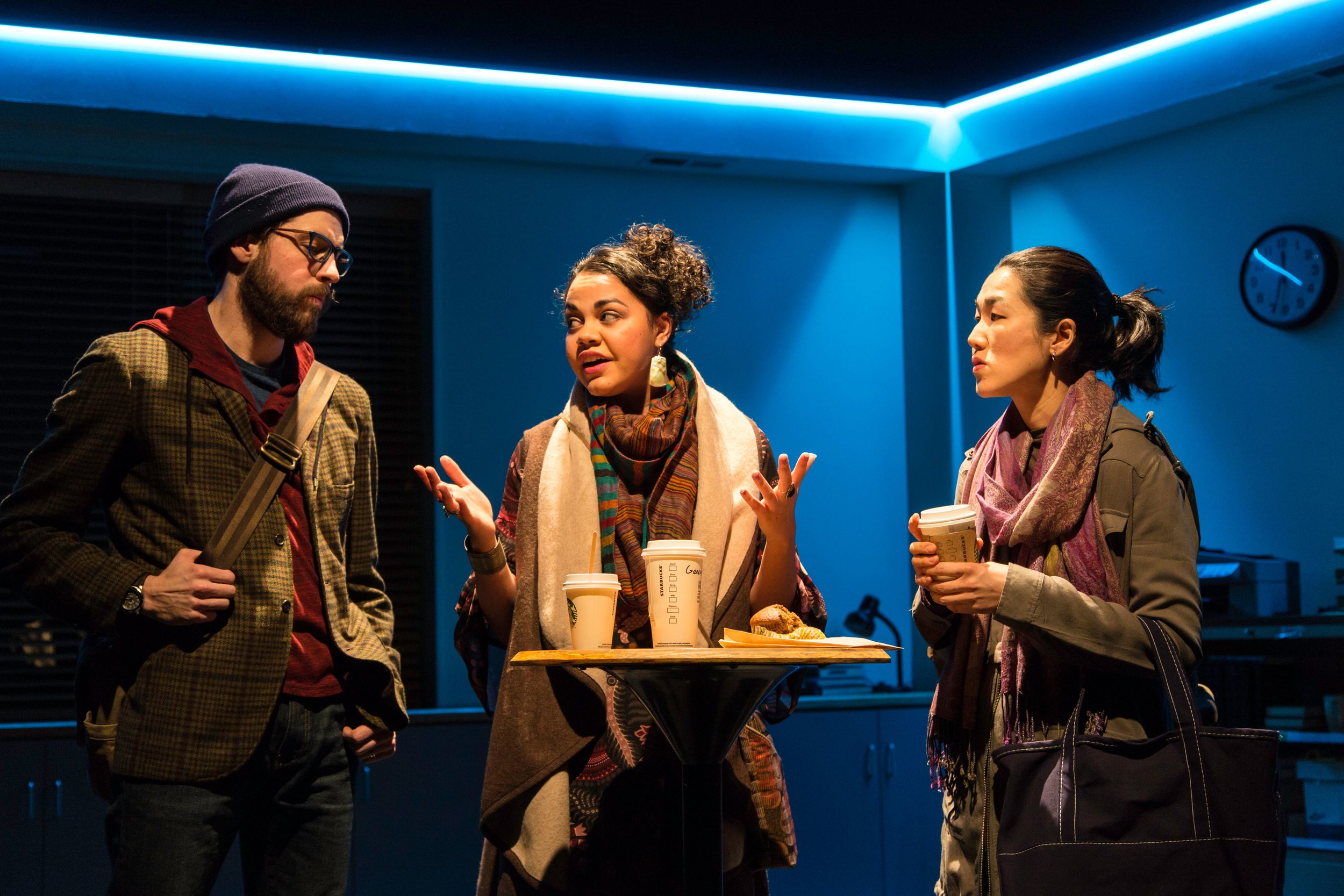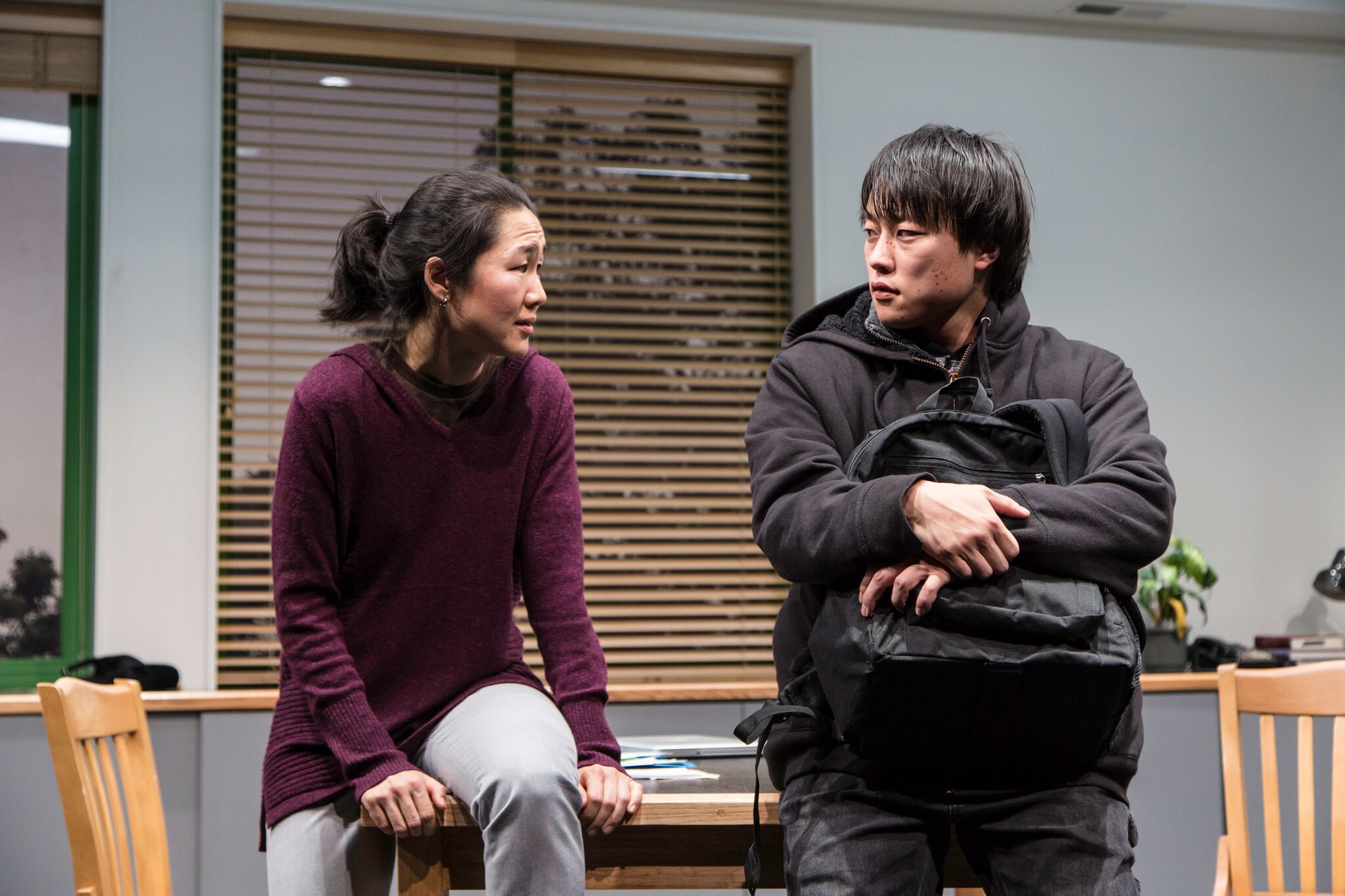Review of Office Hour, Long Wharf Theatre
With every new mass shooting in the U.S., the media explodes with rhetoric aimed at the problem: gun control, mental health initiatives, the anomie of the modern world, the glorification of violence and the fixation on “the lone gunman,” the purview of hatred toward certain groups or toward “the public” in general, the loss of some basic human decency that formerly kept all but the most psychotic under wraps. Clearly, there’s no single solution to apply in each case—and law works on a case-by-case basis—and legislation, whatever it may achieve as deterrent, can’t address the underlying sickness that, it seems, our culture is unable to cure.
In her brave and provocative play Office Hour, Julia Cho aims to put her audience in the crucible. We will spend an hour, or so, with a well-meaning writing adjunct Gina (Jackie Chung) and a troubled student, Dennis (Daniel Chung), who may be at a crisis point. Time was, we might assume little enough drama happens when a teacher calls a student in for a conference, now, we may fear the worst.
Gina (Jackie Chung), Dennis (Daniel Chung) (photos: T. Charles Erickson)
In the Long Wharf production, directed by Lisa Peterson, the play’s initial tone—as a trio of adjuncts, Genevieve (Kerry Warren), David (Jeremy Kahn), and Gina, discuss Dennis—establishes a certain sympathy toward the student, if only because we hear two of the three ganging up on him. What’s more, one of the lines Dennis wrote in a poem, quoted by Genevieve, is a scurrilous parody of an Elizabeth Bishop villanelle, far too often used in writing classes. We might suspect that Dennis is a darkly humored misfit his professors don’t appreciate. That view becomes a bit more problematic when David, who teaches screenwriting and is used to violent movie scenarios and who has worked with convicts in writing groups, insists that Dennis is scarier and less engaging than any prisoner he has ever met.
Thereafter comes our—and Gina’s—meeting with Dennis, a second-generation Asian-American in a hoodie with a baseball cap, dark sunglasses, and a stoical silence. Gina, appalled by the screeds of bitterness, violence, rape, and death that Dennis seems to pump out with little concern for his readers in the classes he takes, tries to fling verbal coins into the silence, hoping for an echo.
David (Jeremy Kahn), Genevieve (Kerry Warren), Gina (Jackie Chung)
After some dead-ends she finds a path, and we start off on what seems to be a journey through a minefield in search of rapprochement. Almost. Cho employs a theatrical device that keeps us from getting comfortable, maintaining the tension that any loaded firearm in a room should manifest. Here, the gun is in Dennis’ backpack, and that fact might mean the adjuncts’ worse fears could come true.
One of the strengths of this production is the lightning-fast nature of the blackouts and tableaux that escalate later in the play. We glimpse, with each new flash, the differing climaxes, all violent, of various scenarios, each a kind of remix of the ingredients in the crucible, but each tending to that moment when firearms become “the answer.” As theater, the brief “clips” demonstrate a tremendous shift to action and staging over dialogue. Elsewhere in the play, dialogue is all we get, and, it should be clear enough, it’s all we have to delay or deter the moment when swift and destructive action holds sway.
Another strength of this production is Jackie Chung’s Gina. She uses the full arsenal a teacher has at her disposal: empathy, imagination, challenge, sharing to elicit sharing, command, threat, and even an unforced vulnerability that Chung is able to display without seeming at all premeditated or manipulative. On the other side of spectrum, she tries to face her fears and the kind of knee-jerk biases that—displayed amply by David—only derail any hope of conversation with recalcitrant students.
Gina (Jackie Chung), Dennis (Daniel Chung)
As Dennis, Daniel Chung has a gripping slouch and pout. For quite a while Dennis maintains the terse tone of someone who is wary of any and all efforts to break his shell. Whether or not he’s a threat to himself or others, he has worked hard to create an antisocial persona, and Cho’s script is equal to the task of making the chip on Dennis’ shoulder feel tangible. Dennis is too smart to wallow in his misery, and, whether talented or not, he uses writing to “take it out” on the world. The gun, which he claims is for protection against the racists he fears (not without reason), speaks of his acceptance of scenarios of violence with which we are all-too-familiar. At times, Chung’s passionate outbursts feel a bit out of character, but it seems that Peterson and company want us to see Dennis as the type of person—an outsider through the happenstance of birth—set at white heat in our social crucible.
Office Hour treats with seriousness the kinds of topics that might come up in any writing course—the issues of racial and gender identity, the problems immigrant populations face, the conditions for which violence and depression and anger are the fraught symptoms, and of course the questions of how to reach an audience and what kind of language and depictions are appropriate or questionable. We might say that the faith implicit in American talk—in no matter what venue—is that seeing and hearing someone who sees it and says it like we would is the thread that keeps the social fabric together. Letting a democracy air its griefs in public is what makes the public forum worthwhile.
Perhaps we used to assume that homicidal sociopaths don’t sign up for writing courses or maintain a GPA in college. These days, there are no such certainties, but what Gina and Dennis also face in Julia Cho’s aware play is the great uncertainties that have always faced the writer: is anyone listening, does anyone care, and does anyone see things the way I do?
Office Hour
By Julia Cho
Directed by Lisa Peterson
Set Design: Matt Saunders; Costume Design: Maggie Morgan; Lighting Design: Scott Zielinski; Original Music and Sound Design: Robert Kaplowitz; Production Stage Manager: Chris Waters; Fight Director: Thomas Schall
Cast: Daniel Chung, Jackie Chung, Jeremy Kahn, Kerry Warren
A Co-Production with Berkeley Repertory Theatre
Long Wharf Theatre
January 17-February 11, 2018


